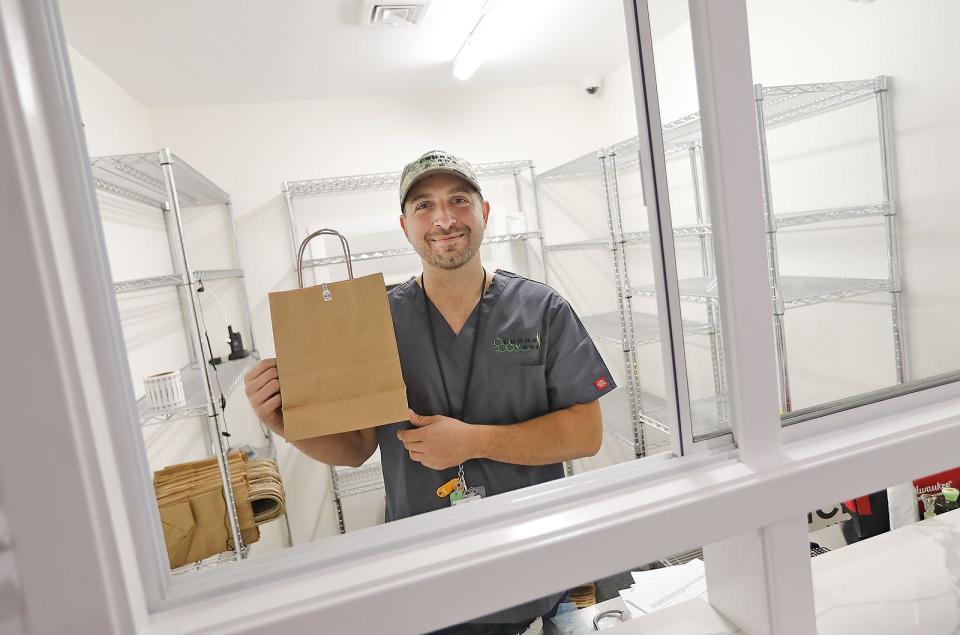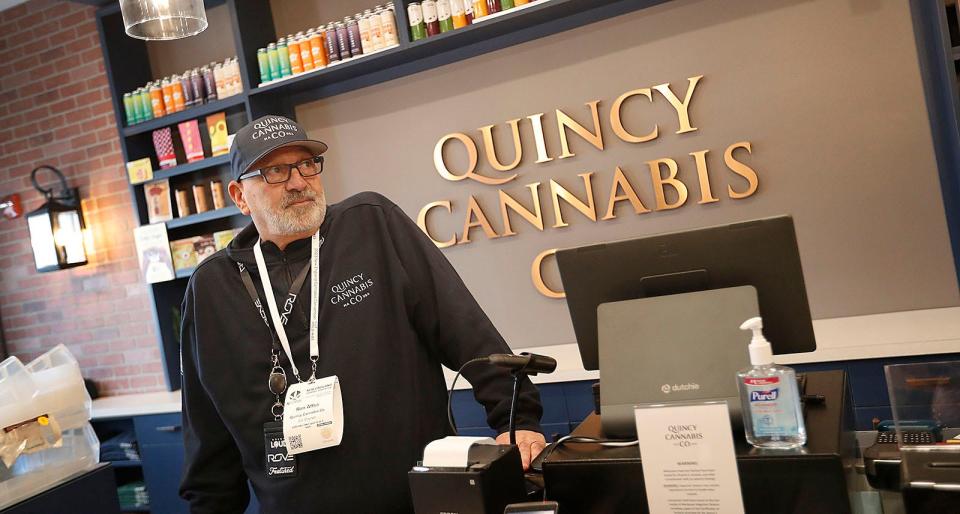As state changes cannabis regulations, why some South Shore officials are crying foul
Some city and town officials are worried that new regulations issued by the state Cannabis Control Commission, which regulates the marijuana industry in Massachusetts, will take a significant bite out of their revenues.
The new rules include restrictions on "community impact fees" that cities and towns charge cannabis stores. The fees are intended to cover municipal costs generated by marijuana stores, such as overtime for public safety employees and traffic studies.
Many towns and cities charge 3% of a cannabis business' gross revenues as an impact fee, the maximum allowed. That's on top of a 3% local sales tax and a 17% state sales tax.
Some businesses and industry groups have cried foul, claiming municipalities have been collecting impact fees without accountability or justification.

Others argue that impact fees have tilted the playing field in the favor of larger, well-financed firms better equipped to absorb the high costs of entering the industry.
In a 2022 letter to state legislators, then-Cannabis Control Commissioners Shaleen Title and Steven Hoffman wrote: “The host-community agreement process has been abused to the detriment of small and minority-owned businesses for almost six years straight now.”
Some municipalities have agreed with that opinion. In November 2022, Boston not only stopped collecting impact fees but returned $2.86 million to nine cannabis shops in the city, according to Cannabis Business Executive.
A sweeping cannabis reform bill signed by then-Gov. Charlie Baker in August 2022 aimed to crack down on the fees.
The Cannabis Control Commission spent more than a year producing regulations to govern the new law's implementation. In September, it voted 3-1 to approve those regulations, which will go into effect in March.
Under the new rules, cities and towns charging community impact fees will have to produce itemized invoices documenting each expense, its purpose and its relation to the activities of a specific retailer. Municipalities will no longer be able to charge a percentage of gross revenues, as many have done in the past.
The Secretary of State's Office published the new regulations in full on Friday, Oct. 27.
Rockland: a small town with a lot to lose under the new cannabis regulations
Rockland Town Administrator Doug Lapp told The Patriot Ledger that the regulations effectively "move the goalposts" after the game has started.
He said that when Rockland residents voted to allow adult-use recreational marijuana stores in their town, they did so under the assumption of certain financial benefits. Lapp said that by changing the framework in which voters approved retail marijuana, the commission could undermine public trust in government.

Rockland, a town with fewer than 20,000 residents in an area of about 10 square miles, has five-year agreements with four recreational marijuana dispensaries: CannaVana, Health Circle Inc., GreenRock Cannabis and Two Buds, the last of which has yet to open.
Each agreement stipulates an annual impact fee of 3% of gross revenues. CannaVana was the first pot shop to open in Rockland, in August 2021, followed by Health Circle in February 2021 and GreenRock in March 2023.
In a letter to the Cannabis Control Commission, Lapp wrote that any attempt to invalidate these agreements through retroactive application of new regulations would violate the U.S. Constitution. He urged the commission not to apply the new rules to existing agreements.
"My fear has come true," Lapp told The Patriot Ledger. "I can't express enough how outrageous I think it is that the contracts that were entered into voluntarily by both parties ... can now be retroactively changed. It's simply outrageous. But the law's the law."
Lapp said Rockland might end up waiving the community impact fees altogether rather than spend the time and resources to document and calculate costs incurred through each dispensary.
"It might cost us more than we're going to get by following this new methodology, so we'll have to look at that," he said.

How much money does Rockland collect in impact fees, and how is it spent?
According to town documents, Rockland received $1.3 million in impact fees from CannaVana as of July 2023. It has received more than $350,000 from Health Circle and an initial $25,000 payment from GreenRock, which opened in March. From May 2, 2021, until May 1, 2023, the town spent about $1.68 million, nearly all it collected.
With the money, the town bought vehicles, including pickup trucks, police cruisers, an ambulance, two fire engines and two electric vehicles for inspectional departments, according to town records. It also bought CPR devices and paved Weymouth Street.
The expenditures were approved by Rockland voters at annual town meeting and paid for out of a "special purpose stabilization fund," where all community impact fees are deposited, Lapp explained in a letter to the Cannabis Control Commission.

Lapp told The Patriot Ledger that some of these purchases might not be allowed under the new rules and that he didn't understand why the commission would take resources away from taxpayers to increase the profits of marijuana stores.
How do South Shore marijuana dispensaries view impact fees? The case of Quincy
In Quincy, whose first recreational marijuana store opened in March, impact fees haven't yet contributed to the city budget.
Quincy Cannabis Co. owner Ron Affsa said that while he will gladly pay for any costs incurred by the city through his business, he's not going to "write a blank check" and would want to see the receipts.
In Quincy, agreements with marijuana businesses are negotiated by the mayor's office. Mayor Thomas Koch's chief of staff, Chris Walker, said the city hasn't collected any impact fees from Quincy Cannabis because of the uncertainty, until now, about whether municipalities can continue to collect 3% of gross revenues as impact fees.
"We'll comply with whatever the regulations are," Walker said.

A representative of GreenRock Cannabis declined to comment. Health Circle and CannaVana managers could not be reached for comment.
Cannabis Control Commission Press Secretary Tim Caputo said that while the regulations give the commission new authority over community impact fees, there's no increased staffing to review invoices of all municipalities charging the fees.
The commission employs about 130 people to oversee a time-consuming licensing process for all of the state's medical and recreational marijuana establishments, Caputo said.
Thanks to our subscribers, who help make this coverage possible. If you are not a subscriber, please consider supporting quality local journalism with a Patriot Ledger subscription. Here is our latest offer.
This article originally appeared on The Patriot Ledger: Changes to fees paid by cannabis dispensaries could slice town budgets

